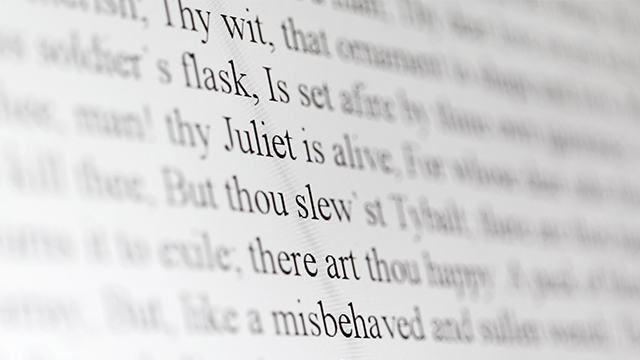10 Tips and Tricks to Feel Confident with Your Shakespeare Monologue
Written by Performer Stuff Staff
Updated May 29, 2020
Shakespeare is in a class of his own when it comes to performance, which means that using a Shakespeare monologue has a whole new set of challenges to face when preparing for an audition. Which monologues are overdone? What is a good monologue for my type in Shakespeare? Here are some tricks and tips for those who are new to Shakespeare and need help on memorization and help on cracking the code on iambic pentameter.
If you’re looking for a Shakespeare monologue to perform, here are some to get you started:
1. What play are you auditioning for?

The Bard has many, many monologues to choose from, and it may feel daunting when searching for the “right” one. Let’s look at some factors first—what show are you auditioning for? Is it a comedy? Tragedy? History? These are the three categories that Shakespeare’s work can be placed into, after you know this, look for a monologue from the same category. Romeo and Juliet? Try Trolious and Cressida; another show about a war and pining lovers. Midsummer? Try As You Like It or Much Ado, other plays where lovers are searching for love and getting mixed up in mayhem on the way.
2. What is the age and status of your character?

Don’t overlook the age and status of the character for which you are auditioning—the same goes for your monologue too. Different ages and archetypes will have a different delivery in their performance. When it comes to age, Prince Hal is a character that spans many plays through Henry V, Parts 1, 2, and 3, and therefore ages as he goes, starting as a teenager and ending well into his 40s. Puck (Midsummer) is a character that has been played by men, women, children, and adults alike. Some characters show no bounds!
Now, ask yourself, is your character a lover? A clown? A historical figure? It is usually easy to decipher if your character is high or low status based on whether they are written in verse or prose. Those with a higher position will have more authority and will speak in a more dignified and tasteful manner, whereas those who are base, the commoners of the town, will be more frank and not as regimented in their speech. Typically, high status is iambic, low status is prose. If a character speaks out of iambic, or is speaking to someone of a different class, they will change into the prose/verse of the character they’re speaking to. There are always clues in the text about what ‘type’ your character is.
3. Is this monologue overdone?

The issue with Shakespeare is that there will forever, and always be, a finite amount of monologues to choose from in his works. At the end of the day, don’t worry about a monologue being overdone; the trick is to make your delivery and performance the one that stands out above the rest. Certain directors may ask you to not use certain monologues, or have a list of those they’d like you to use, and DO follow those instructions when auditioning. But the rest is up to you! However, like all directors, if you know the person you’re auditioning for has been Puck in 15 different productions of Midsummer, it would best behoove you to stay away from that particular character and monologues. You could easily find another mischievous character, like Falstaff (any iteration), who will have great monologues to choose from that are the same ‘type.’
4. Scanning for clues.

Shakespeare wrote for the masses. Everything about his work can be deciphered through the text. Nothing needs to be superimposed, all the clues you need for your understanding and intention are right there in his words. Understanding how Iambic Pentameter works is simple and can open the door to many explanations in text. Once you can scan Iambic, you can learn anything you need to know. Is there a syllable missing at the end of a line? There is always an explanation for an irregular speech pattern. Have an extra syllable? A character may get carried away or feel uncertain. Now, most scenes end with rhyming couplets, typically, right before a character exits. There is comedy when two characters keep throwing rhyming couplets out there, but no one leaves the scene (see the balcony scene from Romeo and Juliet). Shakespeare was all about the wit in his words, so use them! “Stop my mouth,” then you must actually be stopped with another mouth! Stage directions never have to be implied. Direction, interaction, reactions—they are all spelled out for you in his words.
5. Historical context.

There are many words, phrases, and jokes to be found in Shakespeare, but sometimes they only exist in context of the Elizabethan and Jacobian era. For example, characters tend to be sick with ‘melancholy;’ having ‘black bile,’ giving them an unspeakable sadness inside (typically in tragedies). Audiences wanted to see extreme joy and sadness in Shakespeare’s works, and Shakespeare would deliver through the four humors—blood, yellow bile, black bile, and phlegm. Plenty of historical references and topical puns, much like the pop-culture references we have today, are peppered throughout Shakespeare’s works. If you are working on Shakespeare, you must learn to differentiate between a codpiece and a coffer. There are many allusions and explanations that can only be found in historical context, which brings me to…
6. Always use a lexicon.

Make sure no matter what is in your speech, you should know exactly what you’re saying and why you’re saying it. Alexander Schmidt has a very helpful multi-volume series to help you figure out what words and phrases mean that may or may not be used in our vocabulary today. And, hey—you can expand your own knowledge and vocab in the process! Shakespeare was a man of words; he loved to find new words and play with meanings of words when writing. There is a part of Love’s Labors Lost where Costard exalts the gift of a ‘remuneration’ because it is equivilant to ‘three farthings’ Then he receives a ‘guerdon’ for his work, which he finds worth ‘better than remuneration, elevenpence farthing better’. Both remuneration and guerdon are synonyms for ‘gift,’ but Costard thinks that the words given to these types of money indicate their value. Even if you don’t have a hard copy of a lexicon at your disposal, mostly anyone can find the answer they’re looking for on the internet today. Make sure you decipher the text so that you can give the best performance possible.
7. Is there an ‘other,’ or is this monologue to the audience?

“All the world’s a stage” (As You Like It) is a very famous speech, but it should be presented quite differently than “Oh go not to these wars” (Henry VI). Shakespeare is wont to have narrative characters that break the fourth wall and talk directly to the audience. If you are auditioning for a character that is, for all intents and purposes, the narrator, you can begin your monologue search with speeches that do just that. Likewise, if you are auditioning for a character that remains within the world they are in (maybe having an aside here or there, but mostly talking to others), search for monologues that address another person. When you differentiate who you’re talking to, it is much easier to begin working on your monologue.
8. Memorization.

For me, it is most certainly easier to memorize rhyme and iambic pentameter than any other type of script. Repetition always helps, and knowing the end of lines is super helpful because, typically, they do rhyme. Scan it, then forget it! Use the rhyme and rhythm to learn your words, but then forget the ‘gallop’ of iambic when you move to performance. Let the words come naturally just as they would in blank verse and modern speech. Shakespeare’s prose is a bit more difficult to learn, but as soon as you know ‘what’ you’re saying and ‘why’ you’re saying it, it becomes much easier to manage. Don’t get too caught up in the language of it all—if you know what you are saying as an actor through your character, memorization will become much simpler.
9. Command the stage.

Don’t be afraid of your own voice. You must command the language, command the words, and command your presence when performing Shakespeare. Don’t let the enormity of the words make you feel intimidated; take your time to let them sit in your mouth, sit with your character, and truly effect your ‘other’ or the people you are speaking to while rehearsing. Take your time, breathe, relax into it, and make your monologue larger than life, just as Shakespeare wrote it to be.
10. It’s okay to look outside the box.

Many of Shakespeare’s works are being done in a gender bent way, or all characters are played by one sex, so don’t feel that you have to limit yourself with your choice of monologue or choice of performance. In Elizabethan/Jacobian times, all characters were played by men—so who’s to say that if you’re a girl you can’t audition with a Benvolio monologue? Or having a man doing a Helena monologue? Once you accept that Shakespeare is just a commoner’s day out at the theatre, no pretense, all the fear and trepidation are taken away from your performance. Live in the moment, no matter what that moment might be.
More Shakespeare? Yes, please!
- 8 Short Shakespeare Speeches To Recite While Washing Your Hands
- O I Am Slain! How Would You Die In A Shakespeare Play?
- Top 10 List of the Most Offensive Shakespearean Insults
- 10 Words You Use Every Day (That Were Invented By Shakespeare)
- Top 10 Reasons You Should Do Shakespeare (At Least Once)
- 10 Tips for Performing Shakespeare
- 12 Elizabethan and Jacobean Playwrights You Should Know
- The 12 Shakespeare Characters You Meet in High School
- Top 10 Shakespeare Movie Adaptations
- You Know You’re a Shakespearean Actor When…
- 6 Steps to Finding the Perfect Shakespearean Monologue
